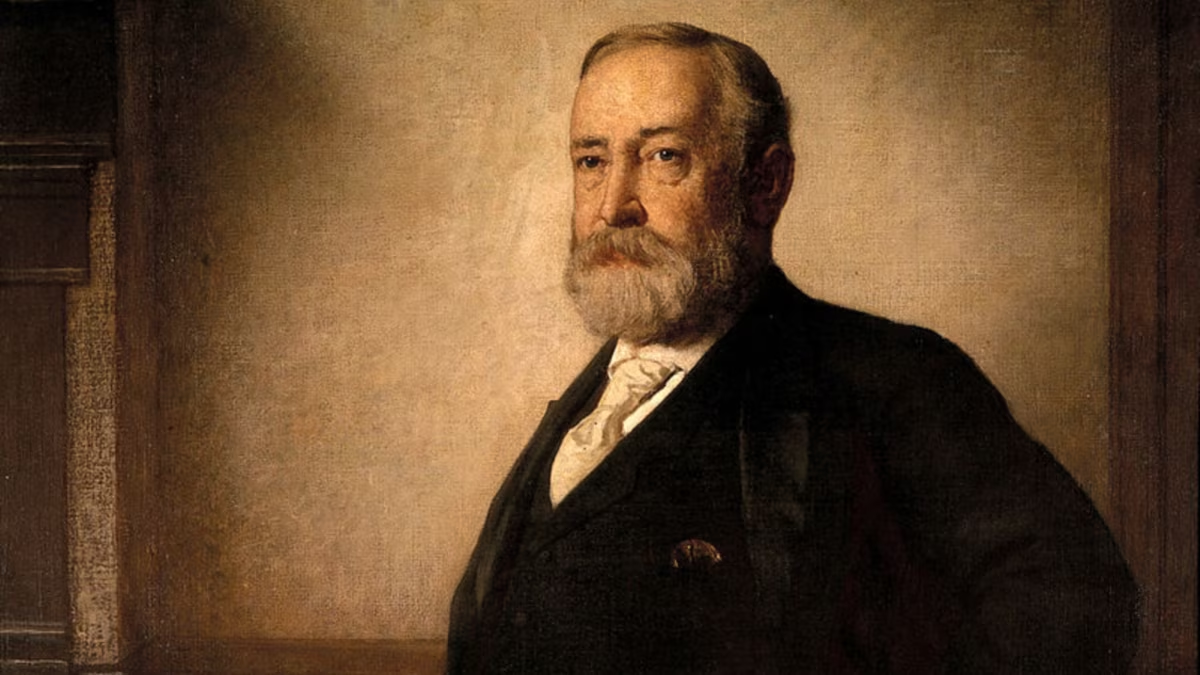In the Election of 1888, incumbent President Grover Cleveland faced off against Civil War hero turned politician, Benjamin Harrison. So, with all that said, let’s dive into it.
Grover Cleveland’s Presidency
After narrowly winning the Election of 1884, Grover Cleveland began enacting his policies, which included vetoing a large number of bills, reducing government spending, supporting free trade, maintaining a non-interventionist foreign policy, and appointing various officials based on merit, making him the first president in quite some time to turn his back on the spoils system.
During his presidency, Cleveland also found time for personal matters, marrying 21-year-old Frances Clara Folsom on June 2, 1886, making her the youngest First Lady in U.S. history.
When the time came for the Democratic Party’s nominating convention, Cleveland was unanimously re-nominated, marking the first time since Martin Van Buren in 1840 that the Democrats re-nominated an incumbent president.
One major change to Cleveland’s campaign ticket going into the Election of 1888 was the need for a new running mate, as his Vice President, Thomas Hendricks, had died just eight months into Cleveland’s term. His new running mate was former Senator Allen G. Thurman of Ohio.
With Cleveland’s record in office and a new running mate, the stage was set for the Election of 1888. Now, let’s see what’s going on with the Republican Party.
Harrison for President
The Republicans had several potential candidates in the Election of 1888, but one notable absence was James Blaine, the man Cleveland had defeated four years earlier. Although Blaine was the front-runner at the GOP convention, he declined to run, recognizing the need to rally behind a candidate who wouldn’t divide the party. He endorsed two candidates: Ohio Senator John Sherman, brother of Civil War hero William Tecumseh Sherman, and Benjamin Harrison, a Senator from Indiana, Civil War General, and grandson of the 9th President, William Henry Harrison.
The Republican Party ultimately chose Benjamin Harrison as their nominee, largely due to his popularity as a war hero, his charismatic speaking style, and his residency in Indiana, a key swing state. Harrison’s running mate was Levi Morton, a former banker, Congressman from New York, and U.S. Ambassador to France, who had previously declined to be James Garfield’s Vice President in 1880.
Now, instead of delving into third-party candidates who played a lesser role this time, let’s focus on the major issues and campaign strategies that defined this race.
The Issue of Tariffs and Campaign Strategies
The biggest issue of the Election of 1888 was tariffs, or government taxes on imported goods. Grover Cleveland, like many Democrats, was a Classical Liberal or Bourbon Democrat, believing in free trade and reducing taxes. Cleveland argued that “unnecessary taxation is unjust taxation.”
Cleveland also opposed pensions for Union veterans as part of his limited government and anti-wasteful spending policies. He based his campaign on these principles and his record in the White House. However, he did not actively campaign, a common practice at the time, and even forbade his cabinet members from campaigning on his behalf, leaving most of the work to his 75-year-old running mate, Allen Thurman.
Benjamin Harrison, in contrast, actively campaigned from his front porch in Indiana, a tactic that had worked well for former President James Garfield. Harrison supported high tariffs, which resonated with factory workers who feared losing their jobs to foreign competition due to free trade policies. He also strongly supported pensions for Union veterans, consistent with his background as a Civil War General.
While these were the primary issues, other factors would play a crucial role in determining the outcome of this election.
The Murchison Letter & Blocks of Five
To secure Benjamin Harrison’s victory, Republicans engaged in some questionable tactics during the campaign.
One such tactic involved the “Murchison Letter,” a letter written by a Republican operative using a fake name to inquire of the British Ambassador to the U.S., Lionel Sackville-West, who the British would support in the election. The Ambassador’s reply suggested that Britain would favor Cleveland, who supported free trade. This was used to sway Irish-American voters in places like New York, who were wary of Britain and feared job losses due to Cleveland’s trade policies.
Another scandal involved William Wade Dudley, Treasurer of the Republican National Committee, who, along with others in Indiana, attempted to split the state into five districts and bribe voters to support Harrison. Indiana was a swing state, so manipulating its vote could significantly impact the election’s outcome. The Democrats discovered this plot, which led to increased scrutiny and eventually contributed to the adoption of secret ballots in future elections.
With these scandals in mind, let’s look at the election results.
The Results
In a closely contested election, candidates needed 201 electoral votes to win. Benjamin Harrison won the presidency with 233 electoral votes, securing key swing states, including his home state of Indiana and Grover Cleveland’s home state of New York.
New York was the decisive factor. Cleveland had barely won it in 1884, but this time, Harrison carried the state, likely due to the effects of the Murchison Letter and Cleveland’s free trade stance. Cleveland won the popular vote with 48.6% compared to Harrison’s 47.8%, making this the third time since 1876 that the candidate who won the popular vote did not become president.
As Grover and Frances Cleveland prepared to leave the White House, Frances reportedly told staff to take care of the building, saying they would return. When asked when, she allegedly replied, “In four years.”
So, that’s the Election of 1888. Benjamin Harrison became the 23rd President of the United States, but will Mrs. Cleveland’s parting words come true in the next election? Be sure to check out my article on the Election of 1892 to find out.
